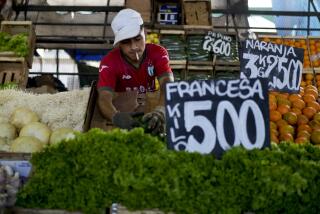Sarney Acts to Stabilize Brazil Economy : Freezes Spiraling Prices, Orders Spending Cuts, Devaluation
- Share via
RIO DE JANEIRO — Facing the worst inflation in Brazil’s history, President Jose Sarney announced an economic stabilization program Friday that includes a general price freeze, deep cuts in government spending and a currency devaluation.
The measures are intended to ease an economic crisis that has created widespread discontent in Brazil and raised the threat of recession.
The program is also part of an attempt to reorder Brazil’s economy as a prelude to renegotiating its $110-billion foreign debt. Since February, Brazil has withheld payments on $70 billion owed to private foreign banks.
The freeze on all prices announced Friday will be enforced for up to 90 days before controlled readjustments are made. At the same time, Sarney said in a nationwide television broadcast, measures will be taken to cut back government subsidies, expenditures and investments.
He said major development projects will be suspended, including railroads, highways, hydroelectric dams, petrochemical plants and a nuclear generator already under construction.
Deficit Spending Blamed
The Central Bank will be prohibited by decree from lending money to the Treasury. Most economists blame at least part of Brazil’s record inflation on deficit spending by the government.
Inflation for May reached 23.2%, the highest rate ever, officials announced Friday. The total for the first five months in 1987 was 127%. If the 23.2% rate for May were compounded over a year, it would amount to more than 1,200%.
Price increases have dampened consumer demand, and inflation has further choked businesses with soaring interest rates.
“Interest rates are at unbearable levels,” Sarney said. “Our economic growth is threatened.
“Millions of businesses are engulfed in an unsustainable situation. Over our workers looms the shadow of unemployment, the fear of losing the purchasing power of their salaries. I know that in these past months there has been much perplexity and suffering, mainly among the most humble Brazilians.
“This situation, without doubt, cannot continue, and it will not continue. We are aware that right now we are making decisions that will improve the lives of Brazilians.”
Predicts Lower Inflation
He said the price freeze will not work without public support, but he added, “I have no doubt that inflation is going to plummet to very low levels.”
Luiz Carlos Bresser Pereira, Sarney’s finance minister since April, announced details of the new program. He said the subsidized prices of electricity and steel will be increased before the freeze, and he said a subsidy on wheat prices will be removed.
Wages will be frozen after an increase of 20% to partly compensate for past inflation, Bresser said. After the freeze is lifted, he said, both prices and wages will be readjusted periodically according to strict guidelines.
With the freeze, “interest rates will drop dramatically,” Bresser predicted.
He called the program the New Cruzado Plan. In February, 1986, the government imposed a similar price freeze program, which was named the Cruzado Plan, after the country’s newly named currency.
Set Off Buying Spree
That program increased consumer purchasing power and set off a nationwide buying spree that fed an economic boom.
But after a few months, manufacturers and retailers began complaining about the frozen prices, and shortages developed. At the same time, Brazil’s trade surplus eroded from monthly levels of nearly $1 billion to less than $200 million.
Foreign reserves dwindled. In November, the government was forced to begin thawing prices, and inflation began to surge.
Many economists said that the Cruzado Plan failed because the government did not gradually readjust prices to correct distortions in the economy. The failure cost former Finance Minister Dilson Funaro his job in April.
Sarney said Friday that the government has learned valuable lessons from last year’s experience, and he promised that the New Cruzado Plan will be well administered.
In the last two months, Brazil’s trade surplus has begun to rebound. The surplus for May has been estimated at $100 million.
Friday, Bresser announced that new restrictions will be placed on imports, and that the cruzado will be devalued by 9.5% in an effort to further stimulate exports.
With its trade surplus restored and the new economic program under way, the government hopes to begin negotiations for softer terms on its existing foreign debt and for substantial new credits.
More to Read
Sign up for Essential California
The most important California stories and recommendations in your inbox every morning.
You may occasionally receive promotional content from the Los Angeles Times.













